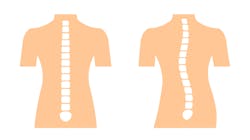Children and teens getting spinal surgery don’t need so many opioids, study suggests
A Michigan Medicine study finds that children and teens with scoliosis undergoing spinal fusion can be prescribed fewer opioids while still receiving adequate pain control after surgery.
For the study, researchers enrolled 72 adolescent patients having spinal fusions at University of Michigan Health and prescribed them 30 doses of oxycodone, as well as standard nonopioid medications, after the procedure. Forty-nine patients, along with their caregivers, received preoperative education on the risks of opioids and the importance of nonopioid pain management options, while the other 35 patients did not receive any preoperative education.
Results published in the Journal of Pediatric Orthopaedics reveal that, despite being discharged with the same amount of opioid and nonopioid medications, 23% of patients in the group who did not receive preoperative education called for an opioid prescription refill compared to 6% of patients who had received preoperative education. When compared to a group of 77 adolescents who previously underwent spinal fusion where there were no standard discharge prescription guidelines, patients in the current study consumed less oxycodone and had fewer days of oxycodone use.
The previous group of patients consumed a mean of 29 doses of oxycodone when receiving a larger prescription quantity. Based on this data, patients in the current study were prescribed 30 doses of oxycodone, yet they only consumed 16 doses while reporting very low pain scores.

